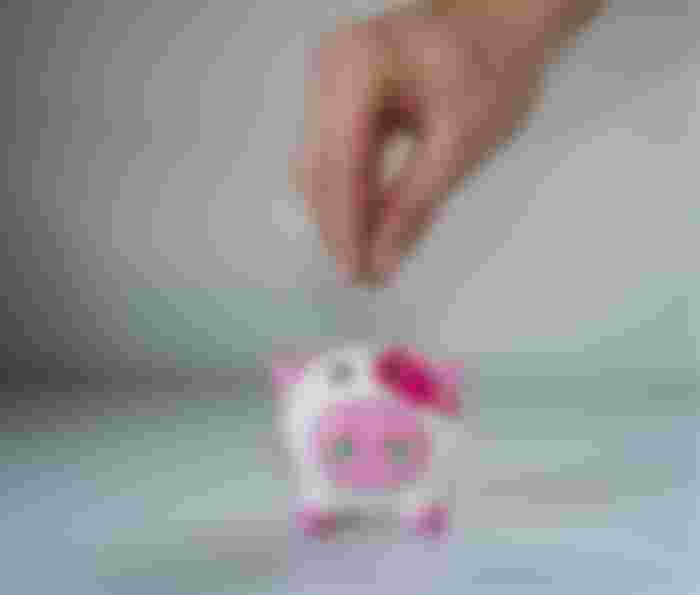
A lot of people are good with money, and a lot of people aren’t. I developed healthy saving and spending habits early on in life. I started having financial goals before I even made my first coin and I’ve always been dedicated to reaching those goals. I’ll be sharing some of those later on. Money has simply always been interesting to me which is also why I went to uni for finance. I don’t think money is something we should be whispering about. I think it’s important that we learn as much as we can about it to make better choices for ourselves.

Now, this is not going to be a article about stocks and investments, you can go watch Graham Stephan or Nate O’Brien for that. The focus of this article will be how you can free yourself from a mindset that is limiting you and therefore save more and spends less. There’s a lot of information to unpack, but I will make sure it’s super easy to follow. So, get comfortable, put your pet in your lap, grab a notebook or an excel spreadsheet, log into your bank and let’s get into it. Quick disclaimer, I know everyone’s financial and life situation is very different. I’ll be talking from personal experience and what I believe to be generally good advice. Right off the bat, the obvious way to increase your savings is to increase your income. But even so, a person could be making a lot of money and still have no discipline when it comes to their finances. So, let’s get into it. You might not have seen this one coming but changing the way you view and feel about money is so important. A lot of people see it as this unattainable thing that just will never happen to them. In every video I’ve ever watched on saving money, the comment section is always packed with people writing things like “can’t relate”, “I’ll never make enough to save that amount”, “I could never XYZ”. Or, “they were probably born into money” or “I’m sure they have rich parents”.
If you label yourself as someone who won’t and can’t, then that’s exactly what you’ll be. If you believe that something is unattainable, it will be unattainable. You need to take control of your narrative. Do you think anyone who was ever successful with money told themselves daily that they couldn’t? I have a hard time believing that, and I believe the very opposite of that to be true.
When you get yourself into the I-am-just-as-capable-as-anyone-else mindset, which, by the way, isn’t a one-time thing, it’s something you’ll need to remind yourself of, you need to have an aim, something to encourage you and keep you on track. Ask yourself questions like, what do you want to save for? What will you do with that money?
How much do you need? Why is it important that you save this money? What can or will be the consequences if you don’t?
I know some people’s aim is simply to see the numbers on their statement grow, which is fine. I need something more than that to keep me encouraged. For instance, two of the biggest financial goals I’ve ever had have been
1. Being able to move and study abroad and
2. Buying my apartment.
Now, I’ve done both. One aim that I have now is that one day I want to own a farm where I can have lots of animals and plant my fruits and veggies. I also have this idea that I want the local elderly people to come over for breakfast and coffee in my garden, like, once a week.

I’ll be like this party for local seniors where we’ll eat good food and play games and share stories. I don’t know why. But I love that idea! That’s not something I plan to happen anytime soon, but rather in 5-8 years or so. This brings me to my next point, which is: it’s never too early to start aiming! As I said, I only recently bought an apartment, but I’ve been looking at apartments for like 5 years or more. Actively for about a couple of years. I wrote about my dream apartment, envisioned myself living there, and I started planning for it, I wrote down the addresses.

I wanted to live on. I looked up expenses and even furniture. Oh, all the Pinterest boards I created! Even though, at that time, realistically, I didn’t know when or if it would become a reality.
But again, going back to the I-am-just-as-capable-as-anyone-else mindset, I’d think to myself “someone else is living there now, why would I not be able to live somewhere like that, too?” I acted as if it was already written in the stars for me, and I started saving for it accordingly. Call it manifestation, call it vision board, I just call it planning.
Now, let’s get into the how-to of things.

First things first, start a savings account if you haven’t already. You need to separate the money that you are allowed to spend freely every month from the money that you are not allowed to spend freely. You can’t have it all in the same place. I’m not going to get into which type of savings accounts and interest and all that, because my viewers are from all over the world so what applies to an American might not apply to someone from the UK. There are tons of good information you can find online and you can also talk to different banks. Ok, you’ve now opened your savings account. Congrats! Now, it’s time to figure out how much you can and should be saving. Start by just zooming out. Get an overview of what it is that you are dealing with. here. Where is money coming in? Where is the money going out?
You might even see that you have certain expenses that you don’t even know what they are. I know a lot of people pay for apps and things like that that they have forgotten about or that they just weren’t aware of.
Now, calculate your basic expenses, the non-negotiable stuff that you simply need to pay for survival. That includes things like shelter, food, and anything health-related. It might include transportation or debt and other things as well, depending on your situation. Once you have those expenses down, look over all of them and see if what you’re paying is reasonable and if there’s any way you could keep any of those costs down.
How much are you paying for your phone? How much are you paying for your car? Could you switch any of those things out for a cheaper alternative, and hence, be able to save a few extra dollars or euros or pounds or whatever currency, each month?
Food can be a big one here. I cook at home 99.9 % of the time, I think eating out all the time is a total waste of money unless you’re very passionate about food and it’s one of your greatest pleasures in life and you have the means to treat yourself.

But even so, cooking is fun and it’s also a lot healthier to cook at home.
After you’ve calculated your total expenses, see how much of your income is left. Now, let’s move on to the things that you don’t necessarily need in life, but rather, that you want. Netflix. Spotify. Ubering everywhere. Shopping. Any bad habits like cigarettes or alcohol.
How much are you spending on those things each month? This brings us to the tough one, the one that stains, which is that life is all about priorities and sacrifices. In money, in your personal life, in your relationships, in your career. It’s an endless loop of “am I willing to give this thing up for that thing?” Everything in life is an exchange.
So, what are you willing to exchange for some extra cash into your savings account?
Personally, there are a lot of things that I just won’t spend money on, where I would rather have the extra cash. Getting my nails done is one of those things. Very rarely will I get coffee or any overly prised beverage that I can make myself? Having a car. At least not at this stage in my life. I don’t shop on sale just for the sake of it. The list goes on. If you’d like a video on things I don’t spend money on and why and what I do or use as substitutes, by the way, let me know in the comments. So, look over your “but-I-want-that” expenses and see where you can cut down the costs. Now you might think “but all of those things only add up to around 100 dollars a month, how’s saving that going to get me anywhere?”. It does. Money adds up. Now before we continue, let’s talk about some of the things that I think are worth spending on, I’d like to take a moment to thank our sponsor today, Squarespace. Now if something is going to improve or lift you or your brand, I think it is worth the investment no doubt. Having a website is one of the things that fall into that category. Whether you are an entrepreneur, an artist, a blogger, or if you just want to put together a portfolio—having a professional website will benefit you. With Squarespace, it’s really easy to do that. You just pick one of their templates and start building a suite that suits your needs.
Alright, this next point here is probably the most crucial one. So, I know a lot of people struggle with falling into temptation easily. We see something we like and think “why not just buy it?”. We walk past our favorite restaurant and think “what’s spending an extra 15 dollars today going to do?”. We see other people have something and think that we want it too. We spend 50 dollars on wine because you only live once.
So, the key to really sticking to this one, besides learning what is truly a priority to you and what is not, (which, by the way, you need to make an extensive list of that) is to practice delayed gratification. Essentially, learning impulse control. There are tons of good resources you can find on this topic, and it is one of the most important life hacks to learn in my opinion. Essentially, it’s about thinking short-term vs long-term, with the latter of course being the way to go if you want to save as much as possible.
When I was 19 and friends wanted me to spend 100 dollars on the club every weekend, I was like thanks, but I got a farmhouse waiting for me down the line, and chickens are expensive. I do want to throw in a quick tip that used to help me a lot, and that was, whenever I felt the urge to spend money on something, I’d translate the cost of that into the number of hours it would take me at work to make that money, and I’d ask myself “is this thing worth 5 hours at the office?”. Since I did not like my job at the time, the answer was almost always no which was great. But now that I love my job so much, it doesn’t do the trick for me anymore. But I just figured I’d throw that out there. Now, you might be thinking, but am I supposed to just stop living my life and do fun things altogether? What if I want to go eat out or get my nails done or shop? Treating yourself is up for definition and deciding how much wiggle-room you give yourself with your spending is up to you.

I’ve treated myself plenty in life and I keep doing so, but I do it within reason. What “within reason” means to me may not be what “within reason” means to you. How much money it makes sense for me to spend on treating myself based on my finances might not make sense to you based on your finances. What I know for sure, is that I’ve never looked back on my life thinking “if only I would’ve gone to Starbucks every single day and gotten takeout three times a week”. On the contrary, I look back thinking “I’m so glad I decided to exchange some of those products, services, and experiences for the money and put it into my savings account, because now I’m being rewarded for it.” That, to me, is treating myself.

The last thing I want to add is that savings aren’t only meant to go towards one specific thing. People save money because it’s always smart to have a safety net. Life is very unpredictable as we all know. And you never want to put yourself in a situation where you have very little money to your name when presenting that could’ve been possible had you made different life choices.








This is quite an interesting article. I especially appreciate your advice in your third paragraph, which, to me, encourages people to take responsibility and use their agency to act (rather than remain in a victim mindset and be acted upon). In addition, concerning expenses, I find it useful to go through my bank account each month and find out where my money is coming from/going. You mentioned wanting to purchase a farm to grow a variety of things?